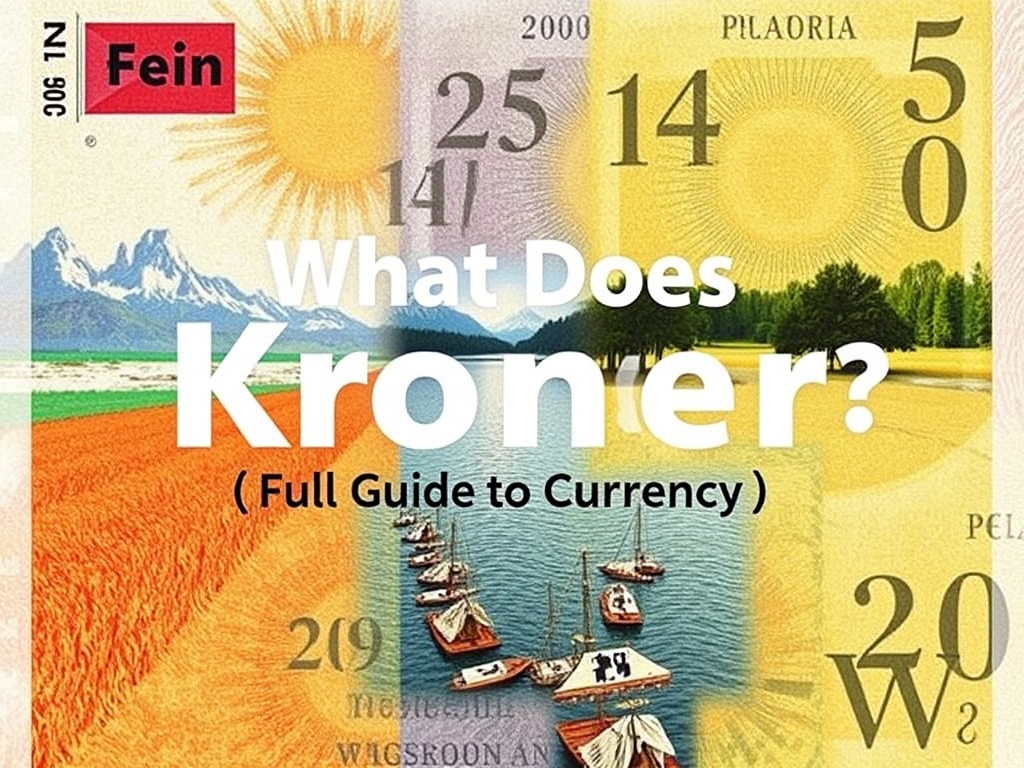Have you ever stumbled across the word kroner and felt a little lost? If you’re in the U.S., it’s not a term you’ll hear every day. Yet, it pops up often when talking about travel, money exchange, or European history.
The word itself carries more than just financial meaning. Kroner is the plural of krone, the official currency in Norway and Denmark. But beyond being money, it also ties back to the idea of a crown, symbolizing tradition, monarchy, and national identity.
Understanding kroner is more than a curiosity—it’s practical knowledge. Whether you’re planning a trip to Oslo, checking global exchange rates, or just curious about how different countries name their money, this guide will give you the clarity you need.
What Does “Kroner” Mean?
The word kroner is the plural of krone, the official currency in both Norway and Denmark. Think of it the same way you’d say “dollars” instead of “dollar.”
In short, when someone says kroner, they’re talking about multiple units of Scandinavian currency.
History of the Kroner
The term comes from the Latin word “corona”, which means crown. Scandinavian countries adopted it in the 19th century, symbolizing royal heritage and sovereignty.
Much like how Britain calls its currency the pound sterling, Norway and Denmark tied their money to tradition through the idea of the crown.
Is Kroner Still Used Today?
Yes. Both Norway and Denmark continue to use the kroner.
- Norway: Norwegian krone (NOK).
- Denmark: Danish krone (DKK).
- Sweden: Uses krona, which is similar but spelled differently.
If you’re traveling from the U.S., you’ll need to exchange dollars for kroner to make local purchases. Exchange rates often fluctuate, so it’s smart to check before your trip.
Why Is It Called Kroner?
The name reflects the monarchies that ruled these nations. By calling their money “crown,” they tied their economy to royal authority and symbolism.
It’s more than just currency—it’s a nod to history and culture.
What Is the English Word for Krone?
In English, krone literally translates to crown. That’s why kroner can be thought of as “crowns.”
For example, if you hear someone say “I paid 200 crowns in Oslo,” they’re really talking about 200 Norwegian kroner.
Other Meanings of Kroner Beyond Currency
While kroner usually refers to money, it can also be:
- A surname, common in some European families.
- A term that’s sometimes confused with similar-sounding words like “coroner.”
But in everyday usage, people almost always mean money when they say kroner.
What Is a Kroner in Electrical Terms?
In rare cases, you might see kroner mentioned in technical or industry-specific contexts, but this is not common. For most readers, kroner will always mean currency rather than an electrical component.
How Do You Use Kroner in a Sentence?
Here are a few examples:
- “I exchanged 100 U.S. dollars for Norwegian kroner.”
- “The hotel in Copenhagen charged me 500 Danish kroner for two nights.”
- “Kroner are worth less than a U.S. dollar, but they go further locally.”
Is a “Kroner Person” a Thing?
Sometimes people search for “kroner person.” This usually points to someone with the surname Kroner. It’s not slang or a label—it’s simply a family name in parts of Europe.
What Is Another Name for Norway?
Norway is officially called The Kingdom of Norway. Historically, it’s been tied to names like Norge (Norwegian) and Noreg.
These connections remind us why the word crown (krone) fits so well with the country’s identity.
Kroner vs. Dollar: Key Differences
For an American traveler, understanding kroner is crucial:
- U.S. Dollar (USD) is a global reserve currency.
- Norwegian and Danish kroner are more regional, used only in their respective countries.
- Value fluctuates: 1 USD is often worth 9–11 Norwegian kroner (rates vary).
So while a meal in New York might cost 20 USD, that same price in Oslo could be 200 NOK.
Conclusion
In the end, the word kroner is more than just a foreign currency term. It reflects history, culture, and the royal traditions of Norway and Denmark, while still being the everyday money people use to shop, dine, and travel. Understanding it helps bridge that gap between curiosity and practical knowledge.
For U.S. readers, knowing what kroner means is especially useful when planning a trip abroad or following global exchange rates. Whether you see it in travel guides, financial news, or history books, you’ll now recognize it as a symbol of both crown and currency.
FAQs
What is the other meaning of kroner?
Besides currency, kroner is sometimes used as a surname, particularly in Europe, but it rarely appears in other everyday contexts.
What is a kroner in electrical terms?
In technical fields, kroner might occasionally appear in niche references, but it’s not a standard electrical term most people would recognize.
How do you use kroner in a sentence?
Example: “I exchanged 100 U.S. dollars for Norwegian kroner.” This shows kroner used naturally in everyday travel or money exchange conversations.
Is kroner still used?
Yes. Norway and Denmark still use kroner as official currency. Travelers often exchange dollars for kroner when visiting these Scandinavian countries.
Why is it called kroner?
The word comes from Latin ‘corona’, meaning crown, reflecting the royal history and monarchies of Norway and Denmark that influenced their currency names.
What is the English word for krone?
In English, krone translates to crown, so kroner simply means “crowns,” used for multiple units of Scandinavian money like Danish or Norwegian currency.
What is a kroner person?
A kroner person usually refers to someone with the surname Kroner. It’s not slang or cultural; it’s just a family name.
What is another name for Norway?
Norway is officially The Kingdom of Norway. Locally, it’s called Norge in Norwegian or Noreg in some dialects, both tied to its cultural roots.

Welcome to Bloomnis.com! I am the admin, here to bring you the best jokes and laughter. My goal is to make your day brighter with funny content. Enjoy jokes, puns, and humor anytime. Keep smiling and have fun with us. Laughter is the best medicine!
















